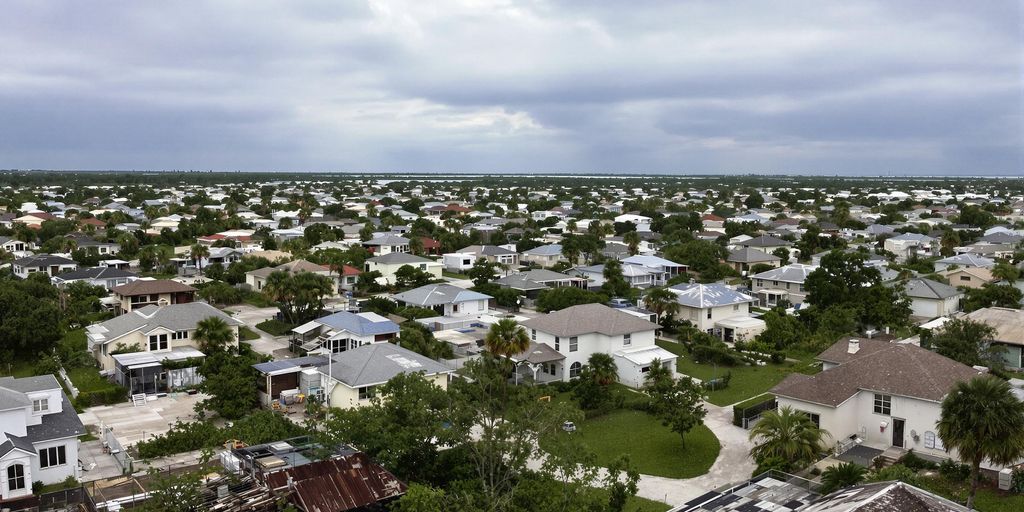Florida’s housing market is experiencing a significant downturn, with several cities facing a high risk of price declines and a general slowdown in sales. This shift comes after years of rapid appreciation, driven by factors such as increased inventory, affordability issues, and rising insurance costs, signaling a necessary correction rather than a full-blown crash.
Florida’s Housing Market Cools Down
After years of unprecedented growth, Florida’s housing market is showing clear signs of a significant slowdown. Data from Cotality (formerly CoreLogic) for April 2025 indicates a statewide average appreciation dip to -0.8%, with eight out of eleven major markets recording negative annual price changes in March 2025. This contrasts sharply with the national trend, which still projects a 4.3% increase in home prices from April 2025 to April 2026.
Key Takeaways
- Cape Coral Leads Declines: Cape Coral has seen the largest year-over-year decline among the top 100 markets, with prices falling by 6.5% in April 2025, returning to spring 2022 levels. It is identified as the "coolest" housing market in the country.
- High-Risk Markets: Five Florida markets are flagged with a "very high risk" of price decline:
- Cape Coral, FL
- Lakeland, FL
- North Port, FL
- St. Petersburg, FL
- West Palm Beach, FL
- Condo Market Struggles: The condo market, particularly in South Florida, is facing a crisis. Sales dropped significantly in April, with Miami-Dade County seeing a 21% decrease and Hillsborough County a 20% decrease. Rising association fees due to new reserve requirements post-Surfside collapse and high insurance rates are major contributors.
- Affordability Crisis: Despite price dips, homes remain unaffordable for many. The median home price in Florida is around $395,000, requiring a substantial income. Rapid price increases outpaced wage growth, pricing out potential buyers.
- Increased Inventory: A surge in available homes is shifting leverage from sellers to buyers. When supply outpaces demand, prices tend to fall as sellers compete.
- Rising Costs of Ownership: Beyond mortgage rates, skyrocketing homeowner’s insurance costs, property taxes, and HOA fees are making homeownership increasingly expensive, deterring buyers.
- South Florida Slump: Miami-Dade, Broward, and Palm Beach counties are experiencing a months-long slump in residential sales. While luxury properties still perform well, the middle market, especially condos, is struggling.
What This Means for Buyers and Sellers
For sellers, particularly in high-risk areas, realistic pricing is crucial. Overpricing can lead to longer market times and eventual price reductions. Sellers should be prepared for negotiations and highlight their home’s unique strengths.
For buyers, this market shift presents opportunities. Increased inventory and softening prices offer more negotiating power and a wider selection. However, caution is advised; thorough research, understanding total ownership costs, and patience are key. Buying when it aligns with personal financial goals is more important than timing the market bottom.
Looking Ahead
While the term "crash" might be too strong, a significant price correction is underway in many Florida markets. This correction is seen by some experts as a necessary rebalancing after an unsustainable boom. The future trajectory will depend on continued migration patterns, stabilization of insurance costs, interest rates, and local job market strength. Staying informed and seeking local expert advice is paramount for anyone involved in Florida’s evolving real estate landscape.
Sources
- Is Cape Coral the Next Florida Housing Market to Crash?, Norada Real Estate Investments.
- A look into Florida real estate market, home sales slowdown, WUSF.
- 5 Popular Florida Housing Markets Are at High Risk of Price Crash, Norada Real Estate Investments.
- 2 Florida Housing Markets Flagged for a Major Price Decline Risk, Norada Real Estate Investments.
- South Florida’s residential market is in a months-long slump, New York Post.


